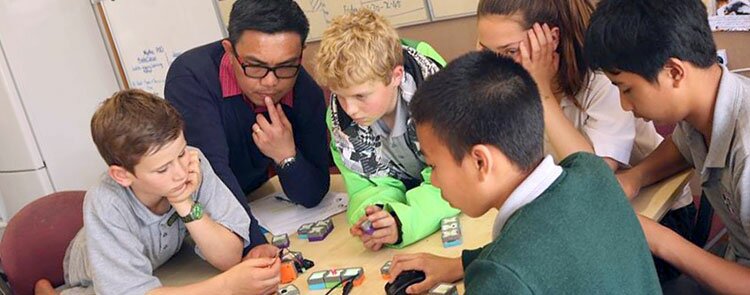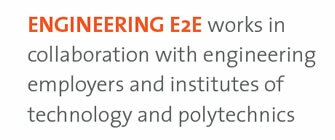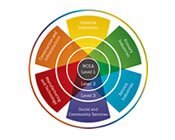INDUSTRY LINKS CASE STUDY
Supporting schools in teaching electronics

A Waikato initiative highlights the importance of engaging young students with engineering. A group of engineers combined their enthusiasm for promoting engineering with selling an educational product. They aim to capture students’ interest in electronics and encourage them into engineering or science-related careers.
Promoting the engineering profession in schools
The story starts with five IPENZ Waikato-Bay of Plenty Branch Members discussing their children’s introduction to robotics at school. They agreed that the programmes seemed to be missing some basic concepts and decided the IQube – developed by a colleague in the Philippines – would be a good way to capture student interest. Providing students with a more in-depth understanding of electronics would, they hoped, lead to more students considering engineering or science-related careers.
 The IQube, a set of magnetic blocks which snap together, was designed to help students understand electronics. They can easily experiment with different combinations of circuits, and the accompanying software gives them real-time input and feedback.
The IQube, a set of magnetic blocks which snap together, was designed to help students understand electronics. They can easily experiment with different combinations of circuits, and the accompanying software gives them real-time input and feedback.
The engineers who established Tactiles Oceania in 2015 to import and distribute the IQube are all employed full-time in other roles and work on this initiative in their own time. After making links with some local schools they surveyed principals to find out how introductory electronics was being taught, and followed this up with surveys for science teachers and then students. The feedback, says co-founder and Electrical Engineer Jeths Lacson, was what they had anticipated. “Most schools with science extension classes, especially in robotics, find their programmes are good and students interested but something is missing, there are gaps.”
Working in schools
The group focused its research on 15 Waikato schools which agreed to be model schools, using the IQube to extend their teaching of STEM (Science, Technology, Engineering and Maths) subjects. The engineers also talked to science educators at the University of Waikato, to get feedback on how their product and pilot programme fits with the science curriculum.
This is a good point at which to note that enthusiasm for producing resources or activities aimed at schools isn’t enough. To be really effective – and to ensure it gets picked up by teachers – any support material should be focused on the New Zealand Curriculum, and ideally designed in collaboration with teachers.
Having considered these aspects of their programme the team started running pilot sessions at some of the schools, focusing on giving students basic electricity and electronics concepts. They also plan a workshop to support teachers delivering an electronics programme with the IQube. The pilots have been useful, Jeths notes, in evaluating the effectiveness of the product, and they have sent several requests for improvements to the manufacturer.
Providing an opportunity for students to interact with engineers is still important, Jeths adds, “We believe engineers are responsible for motivating the next generation to pursue engineering careers. We need to teach them to walk before they run. Learning the basic principles of science through electricity and electronics concepts gives students a stronger foundation, one that may allow them to explore higher branches of science and engineering when they grow up.”
Engineering E2E suggests any organisations or individuals interested in promoting careers contact Futureintech which recruits and trains technologists, engineers and scientists to visit schools as Futureintech Ambassadors:
Raising awareness of engineering careers
The first pilot programme was at Peachgrove Intermediate, which runs a robotics unit as part of its Gifted and Talented (GATE) science extension programme. Although the Year 7/8 students involved hadn’t had much exposure to the concepts behind electronics, teacher Christine Te Kiri says they picked the basic concepts up quickly. “At first they thought that playing with the blocks was too simplistic. Then they realised there was a lot more to it and started to think about the complexity of what more they needed to do.”
Peachgrove tries to expose students to a range of careers and the NCEA pathways they will need. In past years the school has asked engineers to visit – usually parents who are engineers or through requests to the University of Waikato – to discuss their careers. While the GATE students had a higher level of awareness around careers based on maths and science and some were already considering engineering, interacting with engineers did inspire others who hadn’t previously thought about engineering.
Success
With the pilot programme still being rolled out, it’s early days to assess the impact on students’ career aspirations. Christine mentions one notable example of success – the student who hadn’t known much about engineering began investigating how things work, creating and modifying objects at home. His parents are now considering what engineering pathway he could take. “The pilot has been a good bridge between school and home, and some parents who had no understanding of engineering have now picked it up from their children.”
 The Tactiles Oceania team aims to visit two or three schools a week. The challenges common to all the schools are becoming apparent, Jeths says. “Teachers need support in this area. Most are eager to upskill to teach STEM but lack the proper teaching tools and support from the experts – us!” Another challenge is cost, so they are looking at a crowdfunding campaign to reduce the price by 50%.
The Tactiles Oceania team aims to visit two or three schools a week. The challenges common to all the schools are becoming apparent, Jeths says. “Teachers need support in this area. Most are eager to upskill to teach STEM but lack the proper teaching tools and support from the experts – us!” Another challenge is cost, so they are looking at a crowdfunding campaign to reduce the price by 50%.
For Jeths, the project isn’t about making money from selling a product. “Whether or not the schools acquire the kit, we will continue to promote STEM.” He points out that a team of engineers in Christchurch has started working on the same project, and that engineers outside of his company could also be involved. Jeths presented two workshops at the recent TENZ (Technology Education New Zealand) Conference where teachers explored different methods of delivering STEM subjects using the IQube.
Tactiles Oceania website
Thanks to Christine and Jeths for their time and advice. If you have any queries, please get in touch :
November 2015
 |
 |
 |
||
 |
||||
 |
||||
 |






